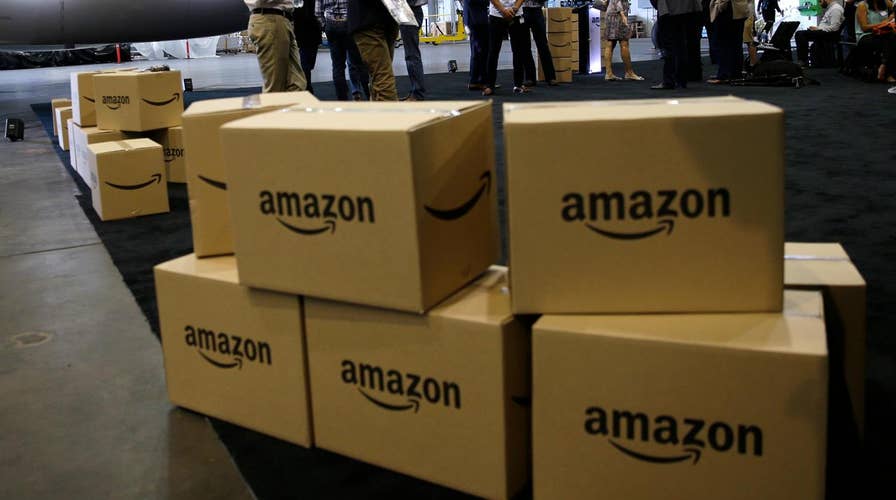Courts could have a say in how much consumers pay for certain products they buy online, as states that have long complained about missing out on sales tax revenue are suing or passing laws to take on online retailers.
Litigation includes South Carolina, which recently sued Amazon over what it claims is $12.5 million in lost sales tax revenue from third-party sellers, while three other online sellers sued South Dakota over its tax law and two trade groups sued Tennessee.
The issue has scrambled traditional party lines, with some Republicans advocating for taxation, in part to level the playing field for other companies. President Trump expressed angst over the impact on Main Street, tweeting last month, “Amazon is doing great damage to tax paying retailers. Towns, cities and states throughout the U.S. are being hurt - many jobs being lost!”
There also are dueling bills in Congress. The bipartisan Marketplace Fairness Act in the Senate allows states to require online retailers to collect state sales taxes if they simplify tax administration. Conversely, the No Regulation Without Representation Act in the House prohibits states from imposing sales tax collection requirements on businesses with no physical presence in the taxing state, and no vote in the representation that would implement such a tax.
It would take an act of Congress to address the matter if the Supreme Court doesn’t overturn a key ruling in Quill Corp. v. North Dakota, which stipulates states can’t collect sales taxes from remote sellers unless a retailer has a physical presence or “nexus” in that state. That ruling came in 1992, when e-commerce was practically non-existent – and also said only Congress could determine rules for remote retailers.
The ruling has been costly for state governments.

States missed out on $26 billion in sales tax revenue in 2015, according to a March joint study by the National Conference of State Legislatures and the International Council of Shopping Centers, both of which support forcing online retailers to collect and remit sales taxes.
'An internet sales tax will be a big winner for state coffers but won’t do a thing to bring more business to local brick-and-mortar stores.'
But for e-consumers, a change could mean higher prices for the items in their online shopping carts.
“The main reason they are pushing for an internet sales tax law is for additional tax revenues that they are legally owed by their citizens but cannot figure out how to collect,” Dave Hermansen, CEO of Store Coach, an e-commerce consulting firm, told Fox News. “That does not sound as good as the spiel they are spinning, though. Undoubtedly, an internet sales tax will be a big winner for state coffers but won’t do a thing to bring more business to local brick-and-mortar stores or create a single new non-government job.”
But taxes wouldn’t likely curb online shopping, either, Hermansen added.
“I would imagine that most online retailers would pass the cost onto consumers,” he said. “An internet sales tax really will not change consumer behavior. They are still going to buy online because it is easier, the selection is better and the information provided online is better.”
Amazon actually pays sales taxes in 45 states—including South Carolina. At issue in the state’s case against Amazon, filed in an administrative law court, is whether Amazon must collect the sales taxes for third-party sellers that use Amazon as a platform to sell their products.
“When Amazon sells goods owned by a third-party supplier on its website, it is not currently remitting sales tax to the department on those sales despite being instrumental in those sales taking place,” Bonnie Swingle, spokeswoman for the South Carolina Department of Revenue, told Fox News. “Any person who transfers goods for consideration, regardless of whether the person owns the goods or not, is a seller under South Carolina law. ... Accordingly, Amazon is subject to South Carolina sales and use tax.”
An Amazon spokesperson declined to comment on pending litigation. However, Amazon’s quarterly report said the lawsuit was “without merit.”
“If South Carolina or other states were successfully to seek additional adjustments of a similar nature, we could be subject to significant additional tax liabilities,” the quarterly report says. “We intend to defend ourselves vigorously in this matter.”
Meanwhile, Overstock, Newegg and Wayfair argued before South Dakota’s Supreme Court in late August against a 2016 state law requiring remote retailers to collect state sales tax if they have more than 200 transactions or $100,000 in sales in the state.
In 2017, Alabama, Indiana, North Dakota, Virginia, Tennessee and Wyoming adopted similar laws or regulations, according to Stateline, a project of Pew Charitable Trust that tracks state governments. The American Catalog Mailers Association and NetChoice sued over the Tennessee rule.
These policies were enacted to challenge the Quill precedent, which could be risky if the high court reaffirms, said Aaron I. Messing, a corporate attorney in New York whose practice focuses on startups.
“Using an Internet website to take orders or otherwise solicit sales and communicate with customers does not create [a] nexus, at least insofar as the website is not housed on a server located within the taxing state,” Messing told Fox News.
In writing a 2015 opinion, Justice Anthony Kennedy suggested the court should revisit the Quill precedent in light of the new economy.
If the high court overturns Quill, it could lead to a patchwork of sales tax rules among states, which would create serious problems for retailers, Tax Foundation spokesman John Buhl said.
“It’s easier to calculate what states would gain in revenue, but it’s not as easy to calculate how many potential vendors might look and see how complicated doing business would be and stay out,” Buhl told Fox News.












































